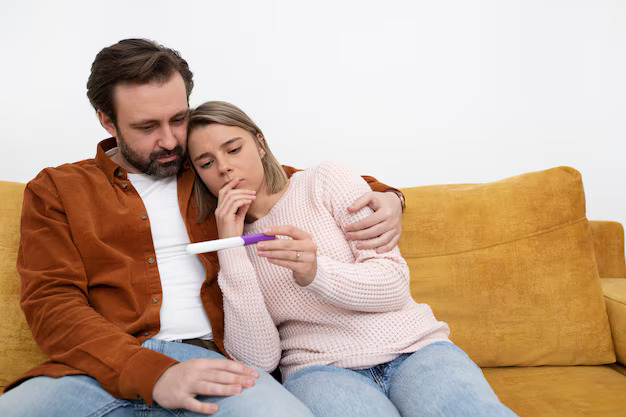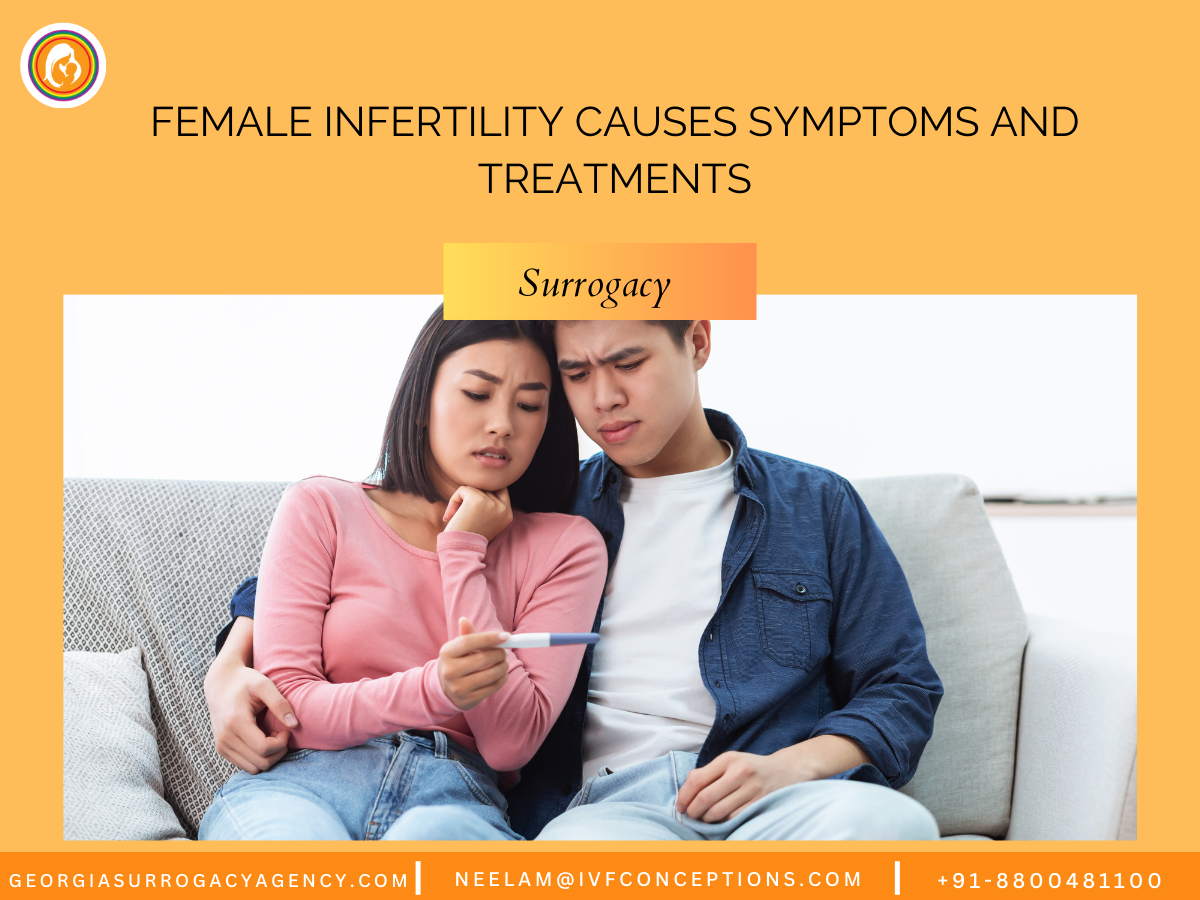Female Infertility Causes Symptoms And Treatments
1 in 8 couples in the U.S. faces infertility, a condition that stops pregnancy despite trying. Many factors can cause it, like hormonal issues, physical problems, lifestyle, and environmental factors. It’s important to know about female infertility causes, symptoms, and treatments for those wanting to conceive.
- Book an online appointment: Get a free online consultation.
- Call\W:+91-8800481100 Email:neelam@ivfconceptions.com
Dealing with infertility is tough, but thanks to advances in reproductive medicine, many can overcome it. This article will cover the main points of female infertility. It aims to help you understand and take steps towards your reproductive goals.
More Resources to Read:
Essential Elements of a Surrogacy Agreement
Budget International Surrogacy Options: Affordable Solutions
Is Surrogacy Covered by Insurance? Your Guide to Coverage
Cost of Gestational Surrogacy: An Overview
Key Takeaways
- Infertility affects about 1 in 8 couples in the U.S.
- Many things, such as hormonal imbalances, physical issues, and lifestyle, can cause female infertility.
- Seeing a reproductive endocrinologist and doing tests is key to finding out why you can’t conceive.
- There are many treatments, like fertility drugs and assisted reproductive technologies, to help you conceive.
- It’s important to deal with the emotional and mental side of infertility too.
Understanding Infertility in Women
Definition and Overview
Infertility means not being able to get pregnant after trying for a year without using birth control. It affects about 10-15% of couples around the world. This issue can make people feel stressed, anxious, and depressed.
Prevalence and Impact
Female issues cause infertility in about one-third of cases. Male and female issues each cause another third. Infertility is tough and complex, with many causes. It deeply affects both individuals and couples.
| Infertility Prevalence and Impact |
| – Throughout the United States, 6.1% of married women aged 15-44 years are infertile (Centers for Disease Control and Prevention, 2015). |
| – Factors such as age, smoking, weight, sexual history, and alcohol consumption can increase the risk of infertility. |
| – Infertility can have a significant emotional and psychological impact, leading to feelings of stress, anxiety, and depression. |
Understanding female infertility and its effects is key for those wanting to start a family. It helps in finding the right support and treatments.
Causes of Female Infertility
Understanding the causes of female infertility is key to tackling this complex issue. Many factors can make it hard to conceive, each needing its own solution. Let’s look at the main causes that affect women’s fertility.
-
Ovulation Disorders
Ovulation disorders, like polycystic ovary syndrome (PCOS) and hypothalamic dysfunction, are big reasons for infertility in women. These hormonal issues can mess up the egg release, making it tough to get pregnant naturally.
-
Fallopian Tube Damage and Blockages
Damage or blockages in the fallopian tubes, often from pelvic inflammatory disease or endometriosis, stop the egg from reaching the uterus. This can happen in about 30% of women facing infertility.
-
Uterine and Cervical Factors
Uterine problems, such as fibroids and polyps, and cervical issues can also cause infertility. These issues can mess up the implantation process or sperm travel, making pregnancy harder.
For some women, the reason for infertility is still a mystery, affecting about 20% of cases. Even with lots of tests, the exact cause might not be found.
Symptoms and Signs of Infertility

Infertility can show in many ways, like not getting pregnant after trying for a year. Many women might not see any clear signs, so it’s key to see a doctor if you’re not pregnant when you expect to be.
-
Irregular Menstrual Cycles
Not getting your period regularly can mean you have an ovulation problem, which is a common cause of infertility in women. Irregular periods, which are cycles that are too short or too long, might be due to PCOS or hormonal issues.
-
Absence of Pregnancy
Not getting pregnant after a year of trying is a clear sign of infertility in women. You might also notice painful periods, hormonal imbalances, and changes in sexual function. This could mean there’s a health issue affecting your fertility.
| Symptom | Potential Cause |
| Irregular menstrual cycles | Polycystic ovarian syndrome (PCOS), hormonal imbalances |
| Painful periods | Endometriosis, uterine fibroids |
| Hormonal imbalances | Thyroid disorders, pituitary gland issues, adrenal problems |
| Changes in sexual function | Pelvic inflammatory disease, sexually transmitted infections |
Not having these symptoms doesn’t mean you’re not infertile. Many women with fertility problems don’t show any signs. So, it’s important to see a doctor if you’re not pregnant when you expect to be.
“Infertility can be a complex and sensitive issue, so it’s essential to work closely with healthcare professionals to identify and address any underlying causes.”
Diagnosing Female Infertility
Figuring out why a woman can’t get pregnant often means doing a detailed check-up. This includes tests and assessments to find out what might be stopping conception. Tests look at ovulation, use imaging, and check hormone levels. These help us understand how the reproductive system works.
-
Ovulation Testing
Checking how well ovulation is happening is key to finding out why a woman can’t get pregnant. Doctors use methods like tracking body temperature, ovulation predictor kits, and ultrasounds to see if ovulation is normal. These help spot any problems with ovulation that might stop pregnancy.
-
Imaging Tests
Imaging tests are very important for checking infertility in women. Tests like HSG and ultrasounds show how the uterus, tubes, and ovaries are working. They can find blockages or other problems that might stop pregnancy.
-
Hormone Evaluation
Testing hormone levels is also crucial for diagnosing infertility. Blood tests check things like FSH, LH, estrogen, progesterone, and thyroid hormones. If hormone levels are off, it could mean there’s a fertility problem.
By looking at ovulation, imaging, and hormone tests together, doctors can usually figure out why a woman can’t get pregnant. This helps them make a treatment plan to help with fertility and increase the chances of getting pregnant.
 Female Infertility Causes Symptoms And Treatments
Female Infertility Causes Symptoms And Treatments
Infertility is a big issue for many women around the world. It’s important to know about its causes, signs, and treatments. This helps couples who want to have a family.
Causes of Female Infertility
There are many reasons why women might have trouble getting pregnant. Problems with ovulation, fallopian tube damage, and issues with the uterus or cervix are common. About 25% of infertility cases in women come from ovulation issues, like PCOS or thyroid problems.
Damage to the fallopian tubes, often from infections or endometriosis, can also stop fertility. Uterine fibroids, endometriosis, and cervical problems are other factors that can affect a woman’s ability to conceive.
Symptoms of Infertility
Not being able to get pregnant after trying for a year is the main sign of infertility. Women may also have irregular periods, miss their periods, or feel pain when having sex.
Treatments for Female Infertility
There are many ways to help women with infertility. Medicines like clomiphene citrate or gonadotropins can help ovulate. Surgery, such as laparoscopy or hysteroscopy, can fix problems like endometriosis or fibroids.
Some women might need assisted reproductive technologies like IUI or IVF. The best treatment depends on the cause of infertility and the woman’s situation. It’s key to work with a healthcare provider to find the right treatment.
Understanding female infertility helps couples take steps to overcome it. Getting advice from a healthcare expert is the first step towards having a child.
Treatment Options for Female Infertility
Female infertility can be treated with several options. These include fertility medications, surgery, and assisted reproductive technologies (ART).
-
Fertility Medications
Fertility medications are often the first step. They include Clomiphene citrate, Gonadotropins, Metformin, Letrozole, and Bromocriptine. These drugs help with ovulation and balance hormones. They can increase the chances of success by up to 30% for women under 39 and those with PCOS.
-
Surgical Procedures
 Surgery can fix issues like blocked fallopian tubes or uterine fibroids. Laparoscopic or hysteroscopic surgery can help. Success rates are about 50% for improving fertility.
Surgery can fix issues like blocked fallopian tubes or uterine fibroids. Laparoscopic or hysteroscopic surgery can help. Success rates are about 50% for improving fertility.
-
Assisted Reproductive Technologies (ART)
When other treatments fail, ART like IUI or IVF may be considered. IVF has seen big improvements. But, these methods are detailed and require a lot of medical attention.
The best treatment for female infertility depends on the cause. Working with a fertility specialist is key. With the right support, many women can overcome infertility and start a family.
| Treatment Option | Success Rate | Considerations |
| Fertility Medications | Up to 30% of women under 39, PCOS | Risk of multiple births, OHSS |
| Surgical Procedures | Around 50% for improving fertility | Laparoscopic or hysteroscopic surgery |
| Assisted Reproductive Technologies (ART) | Improving success rates, especially with IVF | Time-consuming, extensive medical monitoring |
About 50% of women with infertility can find a successful treatment. The outcome depends on the cause, age, and health conditions. With the right care, many women can start a family.
Lifestyle and Environmental Factors
Certain lifestyle and environmental factors greatly affect a woman’s fertility. Knowing about these can help women improve their chances of getting pregnant.
-
Age and Fertility
Age is a big factor in female fertility. As women get older, their fertility goes down, especially after their mid-30s. This happens because the quality and number of eggs decrease, making it harder to conceive.
-
Weight and Nutrition
Keeping a healthy weight is key for fertility. Being too heavy or too light can hurt a woman’s reproductive health. Obesity can lower sperm count and quality in men, but losing just 5% of body weight can boost ovulation and pregnancy chances in obese women with PCOS. Being underweight can cause problems with the ovaries and infertility in women.
-
Smoking and Alcohol Consumption
Smoking and drinking too much can hurt a woman’s fertility. Using substances like tobacco, marijuana, heavy drinking, heroin, and cocaine can lower fertility in both men and women. High blood pressure can change sperm shape, making it harder to conceive. Also, some chemicals can affect both male and female fertility.
By living a healthy lifestyle, like eating right, quitting smoking, and drinking less, women can boost their fertility and chances of getting pregnant.
| Lifestyle Factor | Impact on Fertility |
| Obesity | Linked to lower sperm count and quality in men |
| Weight Loss (5% of body weight) | Greatly improves the likelihood of ovulation and pregnancy in obese women with PCOS |
| Underweight | Linked to ovarian dysfunction and infertility in women |
| Substance Use (Tobacco, Marijuana, Alcohol, Drugs) | Reduces fertility in both men and women |
| High Blood Pressure | Changes the shape of sperm, reducing fertility |
| Persistent Organic Pollutants and EDCs | Affects male and female fertility |
By focusing on these lifestyle and environmental factors, women can take steps to improve their fertility and increase their chances of getting pregnant.
Emotional and Psychological Impact

Infertility can deeply affect women and their partners emotionally and psychologically. The process often brings stress, anxiety, depression, and a feeling of losing control. In fact, up to 40% of women with infertility may get a mental health diagnosis, usually depression or anxiety.
Yet, only about 7% of those facing infertility seek help from mental health professionals. This is worrying, as studies show that both men and women going through infertility treatments like IVF feel more anxious and depressed than others. Women often feel more stressed during this hard time.
“The emotional impact of infertility can be devastating, leaving individuals feeling isolated, hopeless, and powerless over their own bodies and reproductive abilities.”
Research says the emotional strain of infertility is as tough as dealing with serious illnesses. A 1993 study by Domar et al. found that the emotional pain from infertility was on par with cancer, high blood pressure, and heart disease patients.
Getting help from a mental health expert or a support group can really help with infertility’s emotional and psychological effects. It helps people deal with the stress and anxiety that come with it.
Coping and Support Strategies
Dealing with infertility can be tough on the heart, but there are ways to help. Support groups and stress management can make a big difference. These methods help with the emotional and psychological effects of infertility.
-
Seek Emotional Support
Being part of an infertility support group, online or in-person, is very helpful. It’s a place to share feelings and get support from others who know what you’re going through. These groups offer a safe space for empathy and learning how to cope.
Prioritize Self-Care
-
- Try regular physical activities like yoga, walking, or swimming to manage stress and stay well.
- Use relaxation techniques, such as deep breathing, meditation, or guided imagery, to lower anxiety and find peace.
- Take time for self-care by enjoying activities like a warm bath, a massage, or hobbies. It helps you relax from the stress of fertility treatments.
-
Seek Professional Counseling
Talking to a mental health expert, like a therapist or counselor, can really help. They can guide you through the tough emotions, offer coping tips, and help keep your relationship strong during this hard time.
-
Communicate Openly
Talking openly with your partner is key when facing infertility. Share your feelings, worries, and how you’re coping. Listen to each other and support each other. This support can make your relationship stronger and help you face challenges together.
Remember, everyone copes with infertility differently. Try various strategies and find what works best for you. Seek support that fits your needs and preferences.
Preventive Measures and Preconception Care
 Some infertility cases can’t be helped, but you can boost your chances of getting pregnant by taking steps ahead of time. By focusing on preventive actions and preconception care, you can better your reproductive health. This increases your odds of a successful pregnancy.
Some infertility cases can’t be helped, but you can boost your chances of getting pregnant by taking steps ahead of time. By focusing on preventive actions and preconception care, you can better your reproductive health. This increases your odds of a successful pregnancy.
Keeping a healthy weight is key to avoiding infertility. Being too heavy can lead to issues like ovulation problems and a higher risk of miscarriage. Try to keep a healthy body mass index (BMI) by eating well and exercising regularly.
Stopping smoking and drinking too much alcohol is also vital. These habits harm fertility in both men and women. Changing these habits can make you more fertile and boost your chances of getting pregnant.
Preconception care is also vital for getting ready for pregnancy. It means dealing with any health issues like diabetes or thyroid problems and making sure you’re in good reproductive health before trying to conceive. Regular doctor visits, vaccinations, and prenatal vitamins can help make your pregnancy healthier.
By being proactive and focusing on preventive actions and preconception care, you can greatly improve your chances of a successful pregnancy and a healthy baby. Remember, your reproductive health is crucial for your future family’s well-being.
Current Research and Future Directions
Research in reproductive medicine is always looking for new ways to help women with infertility. They’re also trying to understand why some women can’t have kids. These efforts aim to make treatments better and give more hope to those facing infertility.
Recent studies have looked into how endometriosis affects fertility. They found that endometriosis can make it harder to get pregnant with IVF. Also, it can affect how many eggs you get and how well they fertilize.
Researchers are also exploring how iron levels and changes in DNA might affect embryos. These findings could lead to new treatments for infertility linked to endometriosis.
There are also big changes happening in fertility treatments. In the U.S., one in eight couples struggles with fertility issues. New methods like “IVF Lite” and single embryo transfer are making these treatments safer and more effective.
As we learn more, doctors and researchers are working hard to improve treatments for infertility. They aim to make a big difference in the future of fertility care.
| Key Research Findings | Implications for Infertility Treatment |
| Ovarian endometriomas can impact ovarian responsiveness and IVF outcomes | Highlighting the need for careful management of endometriosis in fertility treatment |
| Laparoscopic excision of ovarian endometrioma does not qualitatively affect ovarian function | Suggesting surgical intervention may not compromise ovarian reserve in some cases |
| Endometriosis can influence the number of oocytes retrieved and fertilization rates during IVF | Emphasizing the importance of addressing endometriosis-related fertility challenges |
| Iron overload in endometriosis peritoneal fluid can induce early embryo ferroptosis | Pointing to the potential role of oxidative stress in endometriosis-related infertility |
| Mitochondrial DNA alterations can provide an independent measure of embryonic implantation potential | Highlighting the value of emerging biomarkers in assessing and improving IVF outcomes |
By using these new findings and advancements, reproductive medicine can offer better treatments for women with infertility. This could greatly improve the lives of those struggling to have children.
More Resources to Read:
Egg Donor vs Frozen Egg Bank: Which to Choose?
Essential Elements of a Surrogacy Agreement
Finding a Surrogate: Your Guide to Gestational Carriers
IVF Terminology and IVF Acronym 101: A Guide.
Conclusion
Female infertility is a complex issue that affects many women around the world. It’s not just about not getting pregnant easily. But, there are many treatment options and support out there to help you.
Things like ovulation problems, damaged fallopian tubes, and issues with the uterus or cervix can cause infertility. This happens in 37% of infertile couples. Getting early medical help is key, as advised by the American Society of Reproductive Medicine. This can help you tackle fertility issues early on.
If you’re on the path to becoming a parent, you might look into fertility meds, surgery, or assisted reproductive tech. Remember, you’re not alone in this journey. With support from others and focusing on your health, like managing your age, weight, and exposure to toxins, you can move forward with hope. Keep learning and using the resources out there to boost your chances of becoming a parent.
Our team has over 14 years of experience facilitating surrogacy arrangements, egg donation, and serving as an advocacy resource for infertile couples and LGBTQ individuals seeking to build families. Till now we have helped and supported thousands of the intended parents with their family-building journey, and we can help you as well. Happy to share the references from the past IPs if needed.
If you’d like to learn more about IVF, Egg Donation, or surrogacy services globally, check out the rest of our website at Georgia Surrogacy Agency. We offer legally secure and affordable surrogacy consulting services for FREE.
Our team has over 14 years of experience facilitating surrogacy arrangements, egg donation, and serving as an advocacy resource for infertile couples and LGBTQ individuals seeking to build families.

FAQs for Female Infertility Causes Symptoms And Treatments
What is the definition of female infertility?
Female infertility means a woman can’t get pregnant after trying for a year without success. It affects many people around the world.
How common is female infertility?
About 10-15% of couples face infertility. It can make people feel stressed, anxious, and depressed.
What are the main causes of female infertility?
Female infertility can come from ovulation issues, like PCOS, or problems with the fallopian tubes. Other causes include uterine issues and unexplained infertility.
What are the symptoms of female infertility?
Not getting pregnant after a year of trying is the main symptom. Some may have irregular or no periods due to ovulation problems. But, many may not have any symptoms.
How is female infertility diagnosed?
Doctors use tests to check for infertility. These include checking ovulation, imaging tests, and hormone tests. They look for problems in the reproductive system.
What are the treatment options for female infertility?
Treatments include medicines, surgery, and ART like IVF. The choice depends on the infertility cause.
How can lifestyle and environmental factors affect female fertility?
Lifestyle choices can affect fertility. Being older, overweight, or smoking can lower the chances of getting pregnant. Healthy choices can help improve fertility.
How can the emotional and psychological impact of infertility be addressed?
Infertility can be hard emotionally. Seeing a therapist or joining a support group can help. It’s important to find support.
What preventive measures can be taken to improve female fertility?
Some infertility can’t be prevented. But, staying healthy, quitting smoking, and drinking less can help. Preconception care is also important.
What is the current research and future outlook for female infertility treatments?
Research is ongoing to improve infertility treatments. New treatments and understanding of infertility are promising for those struggling to conceive.
Source Links
- Causes of infertility
- Identifying signs of infertility: Symptoms, causes and first steps – UChicago Medicine
- Female infertility-Female infertility – Symptoms & causes – Mayo Clinic
- Infertility – Symptoms and causes
- What are some possible causes of female infertility?
- Your Guide to Female Infertility
- Female Infertility: Causes and Treatment Options – Women’s Health of Central Virginia
- Infertility: Common signs in men and women

Highly esteemed, authoritative, and trusted professional with a 14-year of experience in international surrogacy. Advocate for Secure, Legal, and Affordable International Surrogacy.
Neelam Chhagani, MA (Counselling Psychology) and Holistic Infertility and Third-Party Reproduction Consultant.
Member of European Fertility Society, Best Surrogacy Blogger of 2020, with 300 dedicated blogs, and top contributor on Quora for Surrogacy.


 Female Infertility Causes Symptoms And Treatments
Female Infertility Causes Symptoms And Treatments
Add Your Comment